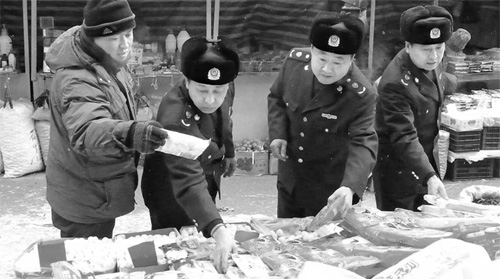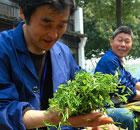Government and Policy
Too many cooks in the kitchen for food safety
By Wang Yan and Zhu Zhe (China Daily)
Updated: 2010-02-25 07:07
 |
Large Medium Small |
Call to establish a rigorous and unified system of testing in China
The country's top legislature urged clearer responsibility among government departments and more detailed regulations to ensure people have safe food to eat.
 Inspetors from Heihe Administration for Industry and Commerce, Heilongjiang province, examine quick-frozen sweet dumplings in a local market on Tuesday. The dumplings are a traditional food for the annual Lantern Festival, which this year falls on Feb 28. [Qiu Qilong] |
"Since the adoption of the Food Safety Law last June, remarkable progress has been made. However, many problems and difficulties remain and to fundamentally change the country's food safety situation is an arduous task," Lu Yongxiang, vice chairman of the Standing Committee of the National People's Congress (NPC), told a bimonthly legislative session that started yesterday.
Lu's remarks came after legislators conducted a two- month inspection of 10 provinces, autonomous regions and municipalities to check how the Food Safety Law had been implemented.
The Food Safety Law has made some changes to the mechanisms of responsibility and supervision among government departments, including health, quality inspection, agriculture, industry and commerce authorities.
| ||||
In addition to legislators recommending that the central government allocate more money to conduct sample tests in less developed counties, Lu suggested updating the country's food safety standards.
According to Lu, China currently has only a small number of national food safety standards and many of the existing ones are not only old, but inadequate for the task at hand.
"Establishing a unified and comprehensive food safety standards system is a long-term mission," he said.
Food safety scares have haunted Chinese people for decades. In 2008, the melamine-traced milk powder killed at least six babies and caused kidney problems for about 300,000 children.
Therefore, the top legislature took steps to draft the country's first Food Safety Law, but legislators' inspection last year shows the implementation of the law is not going well.
Sang Liwei, a food safety lawyer who was invited to help draft the Food Safety Law, said he was "disappointed" at the implementation of the law.
"The law replaced the previous Food Sanitation Law, but it is too general to be carried out," he explained. "The lack of supplementary implementation rules will lead to a messy situation."
Among the ministries and administrations involved in food safety regulations, only the State Administration for Industry and Commerce has issued regulations based on the new law, Sang said.
"The previous departmental regulations were based on the outdated Food Sanitation Law, which means they would not work anymore," Sang said.
He also said having so many governmental bodies involved in food safety lowers their efficiency in regulating the situation.











